Liv Langma Advanced Pro 0 review: Does it really get any better than this?
Liv's latest Langma provides a near-perfect mix of price and performance
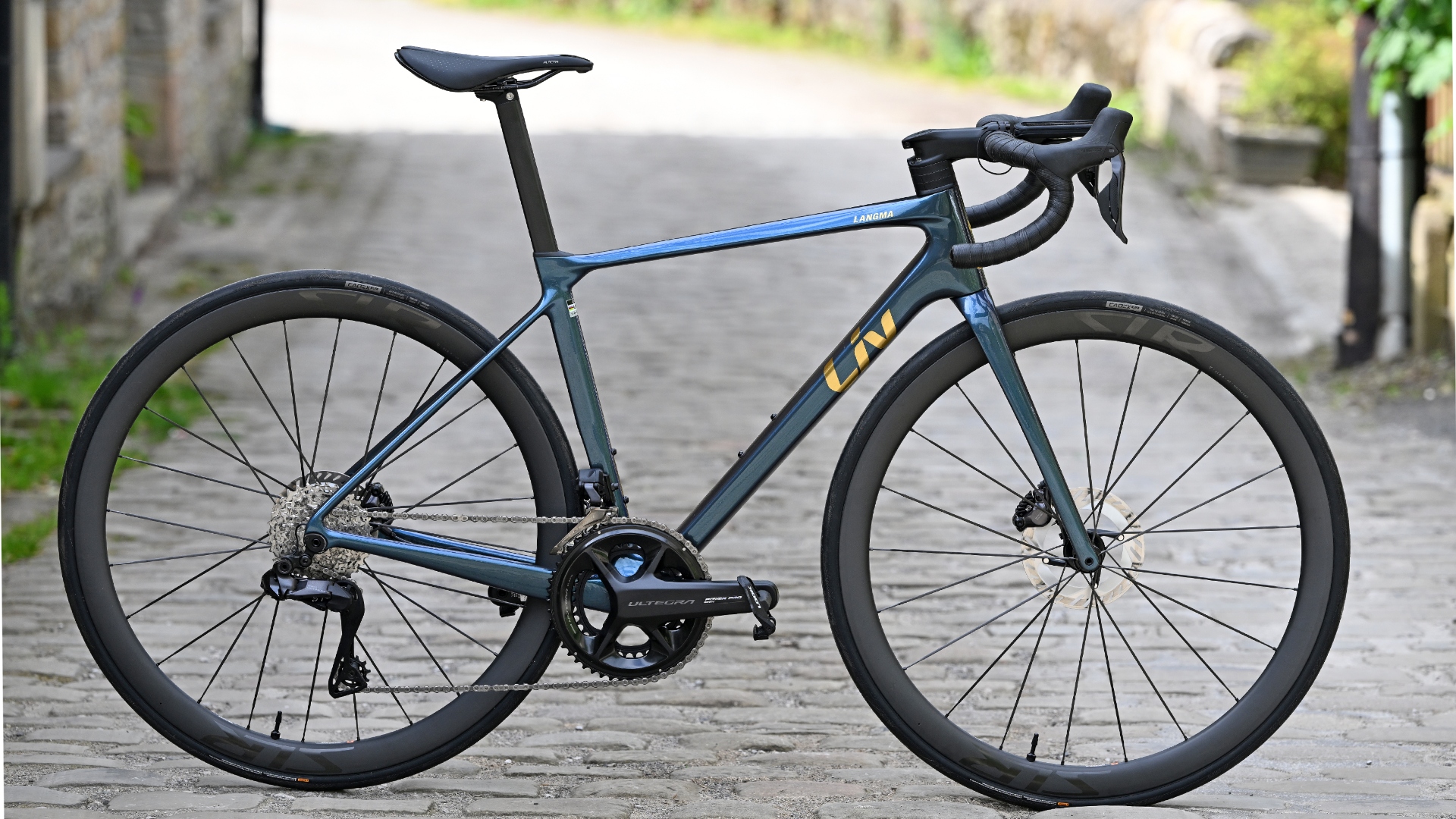
The Liv Langma Advanced Pro 0 feels like a bike of its generation. The brand has managed to improve on an already much-loved model, ironing out the smallest of niggles. The Langma delivers an incredibly rapid and responsive ride, which is simultaneously so comfortable I want to spend hours in the saddle. This bike can do it all.
-
+
Agile and lightweight
-
+
Blends comfort and stiffness perfectly
-
+
Excellent specification
-
+
Integrated power meter
-
-
None
You can trust Cycling Weekly.
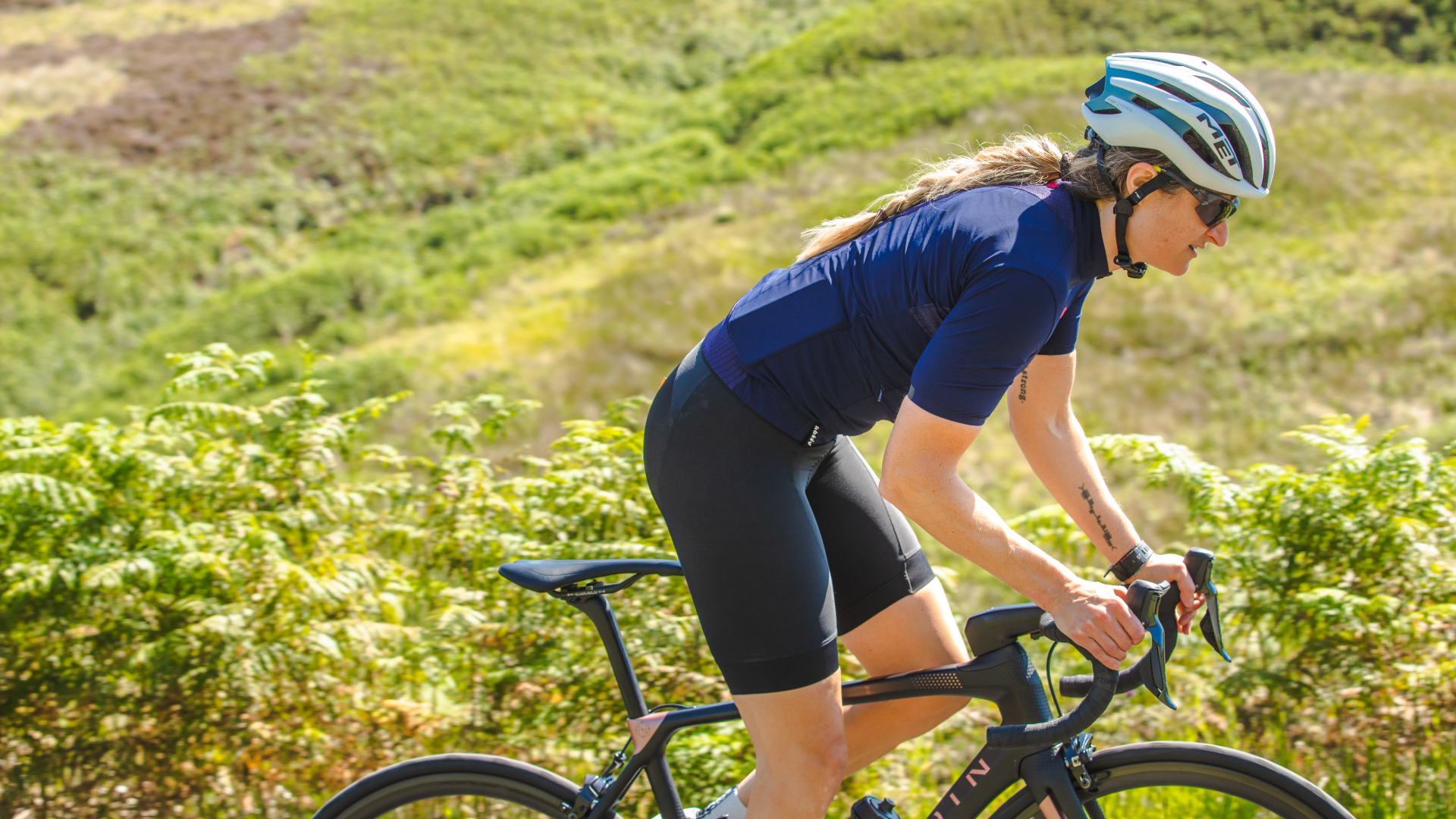
When the latest Liv Langma debuted in mid-June, I recognised it would become one of the most attractive bikes in the pro peloton. It was ridden by the Liv ALUla Jayco team at the Giro d'Italia Women, with a handful of top ten finishes by Mavi Garcia helping to secure the overall team victory.
So it’s about time we took a deep dive into the climbing bike’s DNA to tell you how it’s made, and most importantly, how it rides.
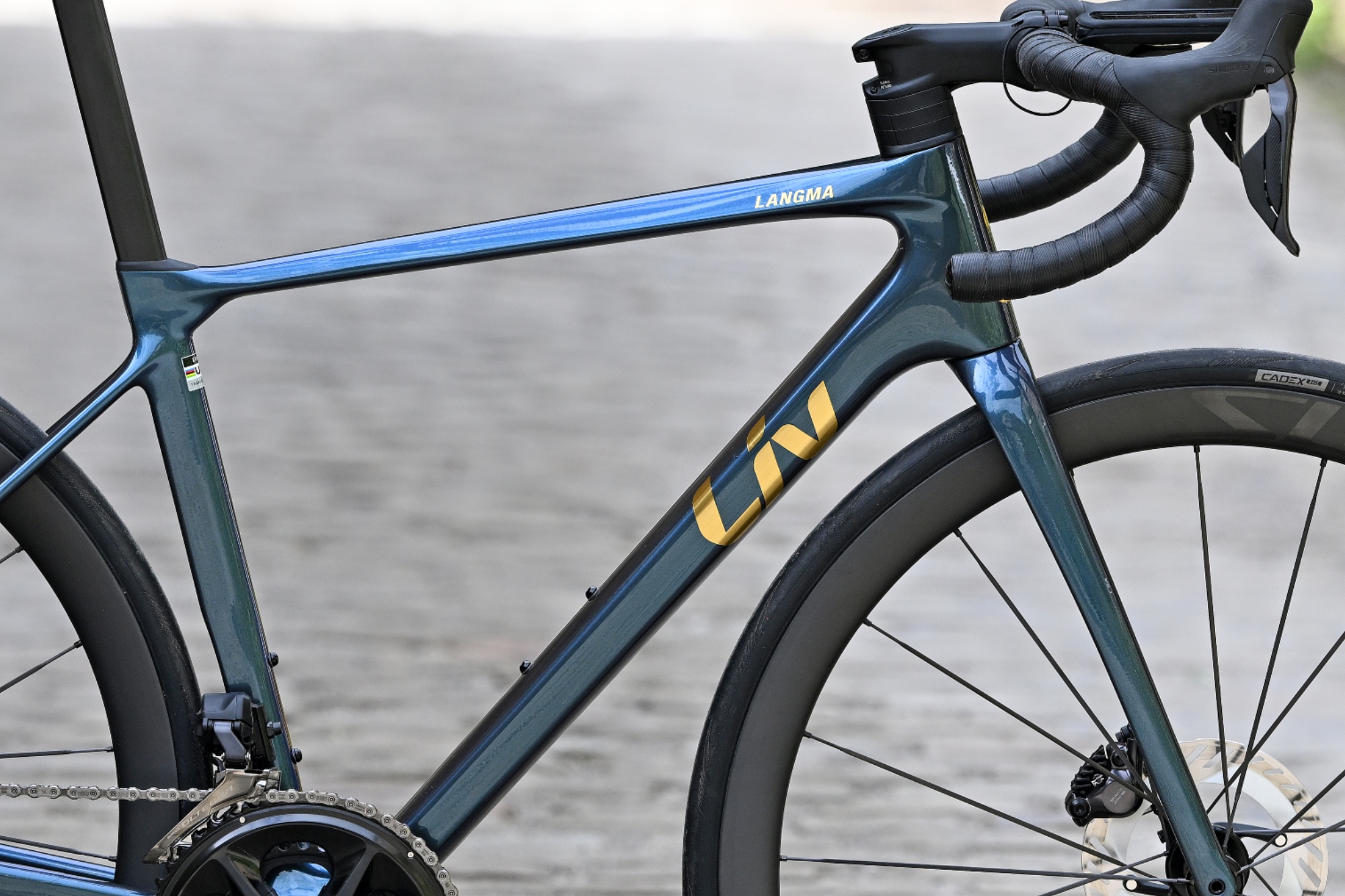
Liv has kept the geometry similar, but made many major upgrades to the frame
Construction
As mentioned in the launch story, this marks the third generation of the Liv Langma range in seven years. I also remarked on how the brand has mirrored many of the construction techniques and materials advances that the newest Giant TCR gained. Not surprising given the sibling relationship between the two brands.
I also mentioned at the time that the geometry of the latest edition would remain the same as the previous model, which confirms its racing credentials. The small Liv Langma Advanced Pro 0 that I’ve been riding comes with a top tube length of 524, a reach of 377mm, a stack of 532mm, a 72-degree head angle, a 977mm wheelbase, and 405mm chainstays.
The same geometry however doesn’t mean the same bike.
According to the brand, a switch to a monocoque layup in the frame build, and an upgrade in the raw carbon material and resin, which has not only contributed to weight savings but improved stiffness too. There's also an increase in impact resistance over the previous Liv Langma models.
Studying the numbers that Liv supplied at the time of launch, the more affordable Langma Advanced Pro 0 frame and fork now weigh a claimed 1600g. Putting that in perspective, it’s a mere 150g heavier than the 2021 range-topping model, demonstrating just how improved the new process is.
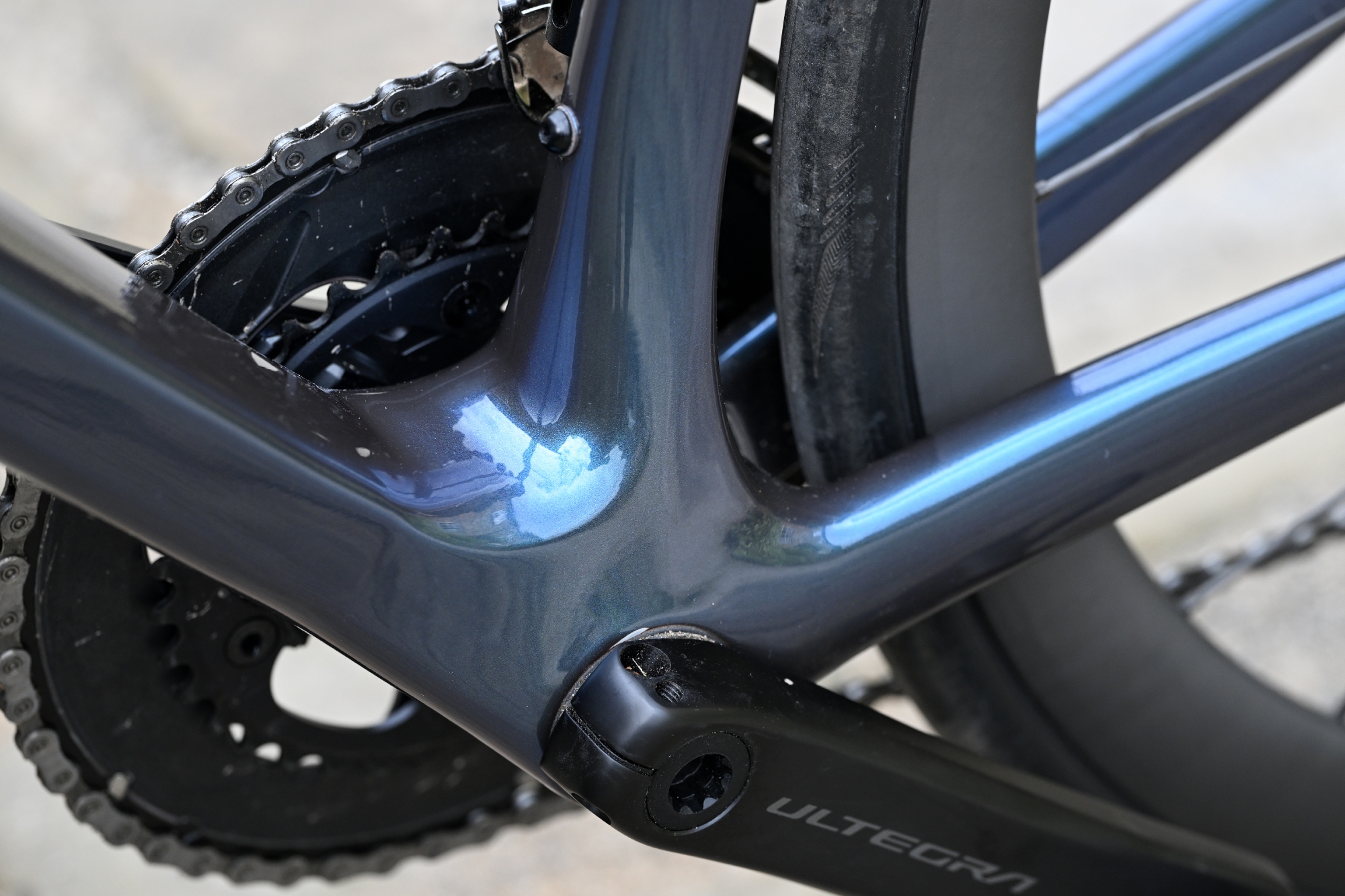
Shimano Ultregra Di2 provided impeccable shifting. No surprise there then.
Aerodynamics in the form of reengineered tubing profiles have also been improved in this latest model. Liv says that its new airfoil sections, on the down tube, seat post and fork help lower drag more effectively across a wider range of angles, when compared to traditional teardrop-shaped frames.
Asking Liv Global Marketing manager, Jen Audia, specifically about aero data and testing with the Langma Advanced Pro 0, she confirmed that, unfortunately, only the range-topping Langma Advanced SL made it to the wind tunnel.
But Audia did confirm that "the Langma Advanced Pro and Langma Advanced frames received the same tube shape refinements, with the exception of the integrated seatpost design (ISP).
"The ISP does improve aerodynamics due to its fully integrated shape. Therefore, while the aero improvements for the Langma Advanced Pro are very similar, they are not exactly the same as those of the Langma Advanced SL."
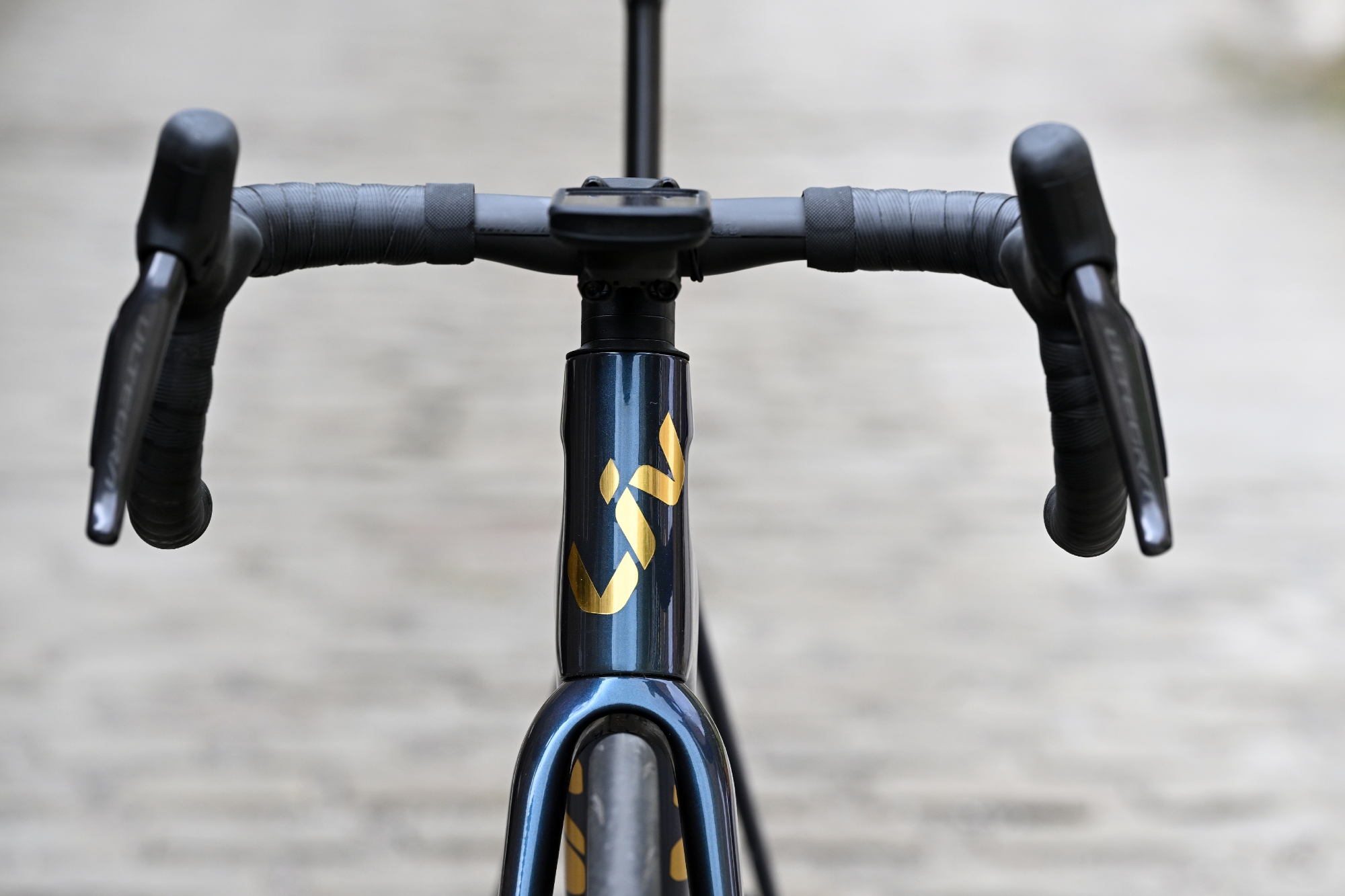
Integrated cabling no doubt contributes to aerodynamic improvements
It is important to consider the whole Langma Advanced Pro 0 package at this stage. The redesigned Liv Contact SLR flared handlebars and new CADEX Max 40 wheelset, and no doubt the integrated cabling, will contribute to aerodynamic improvements.
To any Giant bike fans out there, this is probably reading a lot like the ingredient list of the latest TCR, and you're not wrong. But rest assured, one look at the bike’s geometry, and you’ll realise that the Langma isn’t just a smaller version.
For me, however, the biggest question that still remains is what the aero facelift means for the Liv Enviliv, the brand's specific aero bike?
They are both very different machines, but lining the numbers up next to each other, those differences are marginal.
A longer headtube on the Langma Advanced, 120 vs 112mm, leads to a taller stack, by just 9mm, and there's a slightly longer trail on the Langma Advanced, 68mm vs 66.3mm.
As I wrote at the time of the launch, it’s a revealing set of numbers, which, based on paper alone, leave little to split the two Liv models. It does provide food for thought as to what this means for the consumer (or team choice of bike), especially as leading brands move away from differentiating aero and climbing bikes.
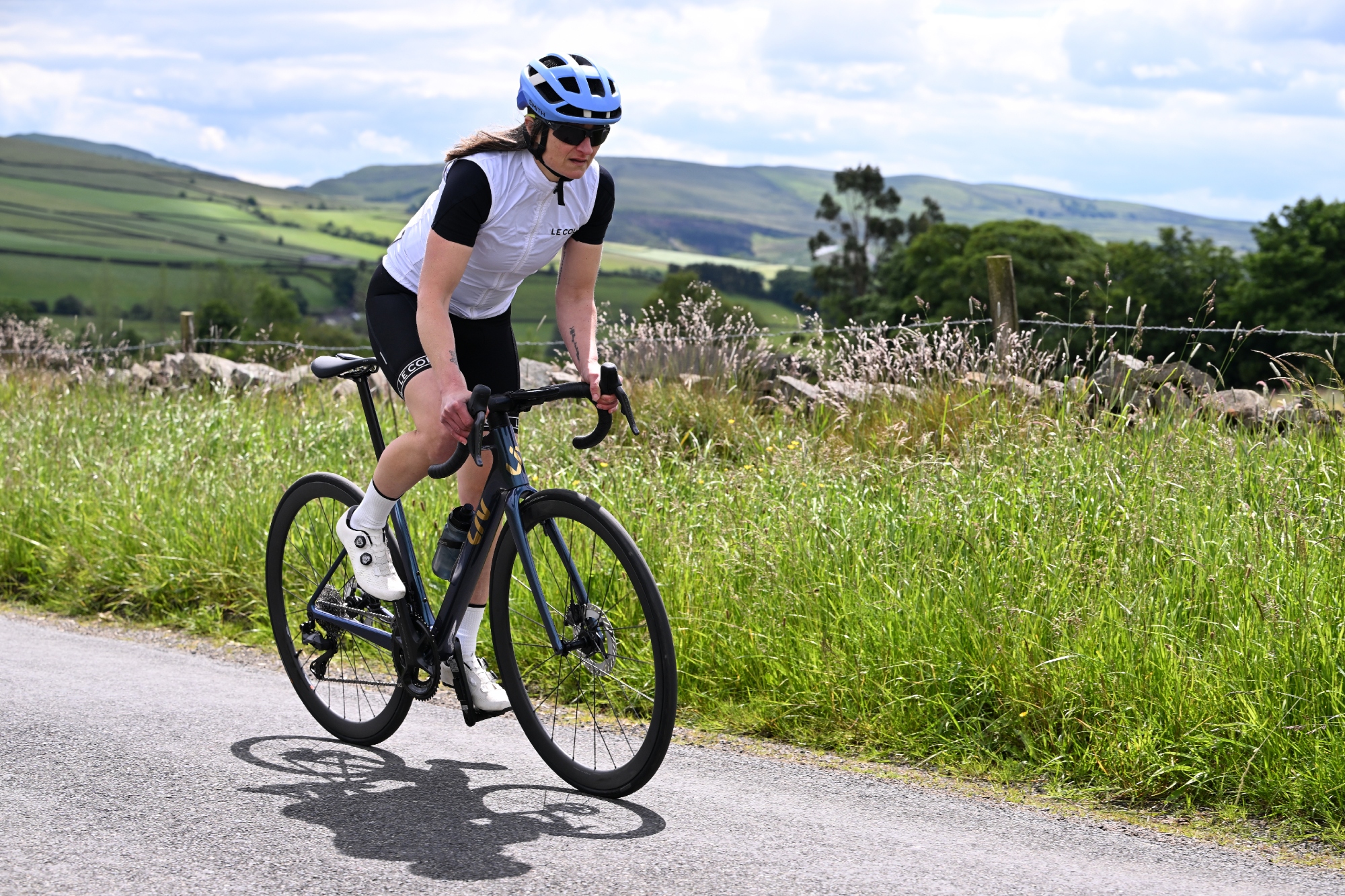
The Langma is impressively reactive, agile and fast when climbing or sprinting
The ride
The month I've spent with the Liv Langma Advanced Pro 0 has cemented my first-ride thoughts.
This bike can do no wrong. I can’t find a weak spot either climbing, sprinting, or even on an all-dayer.
It makes me feel like I’m a young whipper snapper again, capable of endless hours in the saddle, tackling the hardest hills just for fun.
Having taken on many of my local Peak District climbs, I decided to throw all caution to the wind and take a jaunt up Cragg Vale, which at nine kilometres is the longest continuous gradient in England.
I may not have the hillclimbing prowess I once had, but on getting to the top I didn't feel totally turned inside out, which is a testament to the quality of the Langma.
Of course, if I was following any form of training plan, I could have planned a climbing strategy and dosed my effort according to the numbers that the Giant Power Pro cranks were populating my Garmin screen with.
While I'm not taking full advantage of an integrated power meter at the moment, its inclusion does make it way easier to do so in the future, a big perk of the model to be aware of.

About to summit Cragg Vale on the Liv Langma Advanced Pro 0
I would have celebrated the 9km ascent more if it hadn’t been for the gale-force wind on the top of the moor. Only once I had returned from the ride did it occur to me just how stable the bike had been for the entire duration.
Deep section wheelsets normally see me battling to hold a bike steady, especially when it's so exposed, but this was far from a white knuckle ride some bikes deliver in similar conditions. The decision to team the Giant SLR 40 wheelset with Cadex Race GC Tubeless tyres worked out perfectly.
Packaged with the Shimano Ultegra Di2, with its impeccable shifting and braking experience, the Langma fully harnesses every pedal revolution, inspires rider confidence yet remains nimble and agile. It manages to negotiate the tricky sweet spot of providing sufficient road feedback to connect you to the ride, while not rattling your teeth out.
It’s as close to the Wilier Filante as I’ve ever ridden. Having spent longer on the Langma Advanced Pro 0 I realise that both bikes deliver the same sense of urgency, without compromising on comfort.
The Langma would be just as happy on a fast multi-turn circuit as it would on an all-day jaunt. If it's a fast, racy ride you're after - without sacrificing comfort - then you won't be left wanting.
Value
Looking at similarly specced bikes on the market right now, I consider the Langma Advanced Pro 0 is pitched at a fair price, at £6,499/$6,500. However, when compared to the Wilier Filante, Langma looks like a positive bargain at nearly a third cheaper for a similarly specced bike.
Since Liv has managed to create a second-tier bike this good, I suspect the lower-specced Advanced Pro AXS or Advanced Pro with Shimano 105 will also provide a similarly impressive ride.
These keep the same frameset as the Pro 0, but downgrade to an SLR 1 wheelset and Liv Contact SL handlebar.
I don't doubt either would still provide a superb package, but when you get a bike as good as the Liv Langma Advanced Pro 0, it's hard not to consider anything else a compromise.
Spec
- Frame: Advanced-Grade Composite, 12x142mm thru-axle, disc
- Fork: Advanced SL-Grade Composite, full-composite OverDrive Aero steerer, 12x100mm thru-axle, disc
- Groupset: Shimano Ultegra Di2, 36/52, 11x34 with Giant Power Pro power meter
- Stem: Giant Contact SL AeroLight (XS: 80mm, S: 90mm, M: 100mm)
- Handlebar: Liv Contact SLR 31.8mm, 8-degree flare drop (XS: 34/36cm, S: 36/38cm, M: 38/40cm)
- Seatpost: Giant Variant, composite, -5/+15mm offset
- Saddle: Liv Alacra SL
- Wheels: Giant SLR 0 40 WheelSystem, hookless
- Tyres: CADEX Race GC, tubeless, 700x28c

Thank you for reading 20 articles this month* Join now for unlimited access
Enjoy your first month for just £1 / $1 / €1
*Read 5 free articles per month without a subscription

Join now for unlimited access
Try first month for just £1 / $1 / €1
Get The Leadout Newsletter
The latest race content, interviews, features, reviews and expert buying guides, direct to your inbox!
Hannah is Cycling Weekly’s longest-serving tech writer, having started with the magazine back in 2011. She has covered all things technical for both print and digital over multiple seasons representing CW at spring Classics, and Grand Tours and all races in between.
Hannah was a successful road and track racer herself, competing in UCI races all over Europe as well as in China, Pakistan and New Zealand.
For fun, she's ridden LEJOG unaided, a lap of Majorca in a day, won a 24-hour mountain bike race and tackled famous mountain passes in the French Alps, Pyrenees, Dolomites and Himalayas.
She lives just outside the Peak District National Park near Manchester UK with her partner, daughter and a small but beautifully formed bike collection.
-
 Trek, State and Specialized raise bike prices while other brands limit US releases — Is this just the beginning?
Trek, State and Specialized raise bike prices while other brands limit US releases — Is this just the beginning?As tariffs hit, the bike industry is forced to adapt, whether through price increases, limited releases, or a restructuring of supply chains
By Anne-Marije Rook Published
-
 How I got my non-cyclist friend hooked on riding bikes — and how you can, too
How I got my non-cyclist friend hooked on riding bikes — and how you can, tooWith a little bit of gentle guidance, “bikes aren’t my thing” can turn into “when’s our next ride?”
By Marley Blonsky Published
-
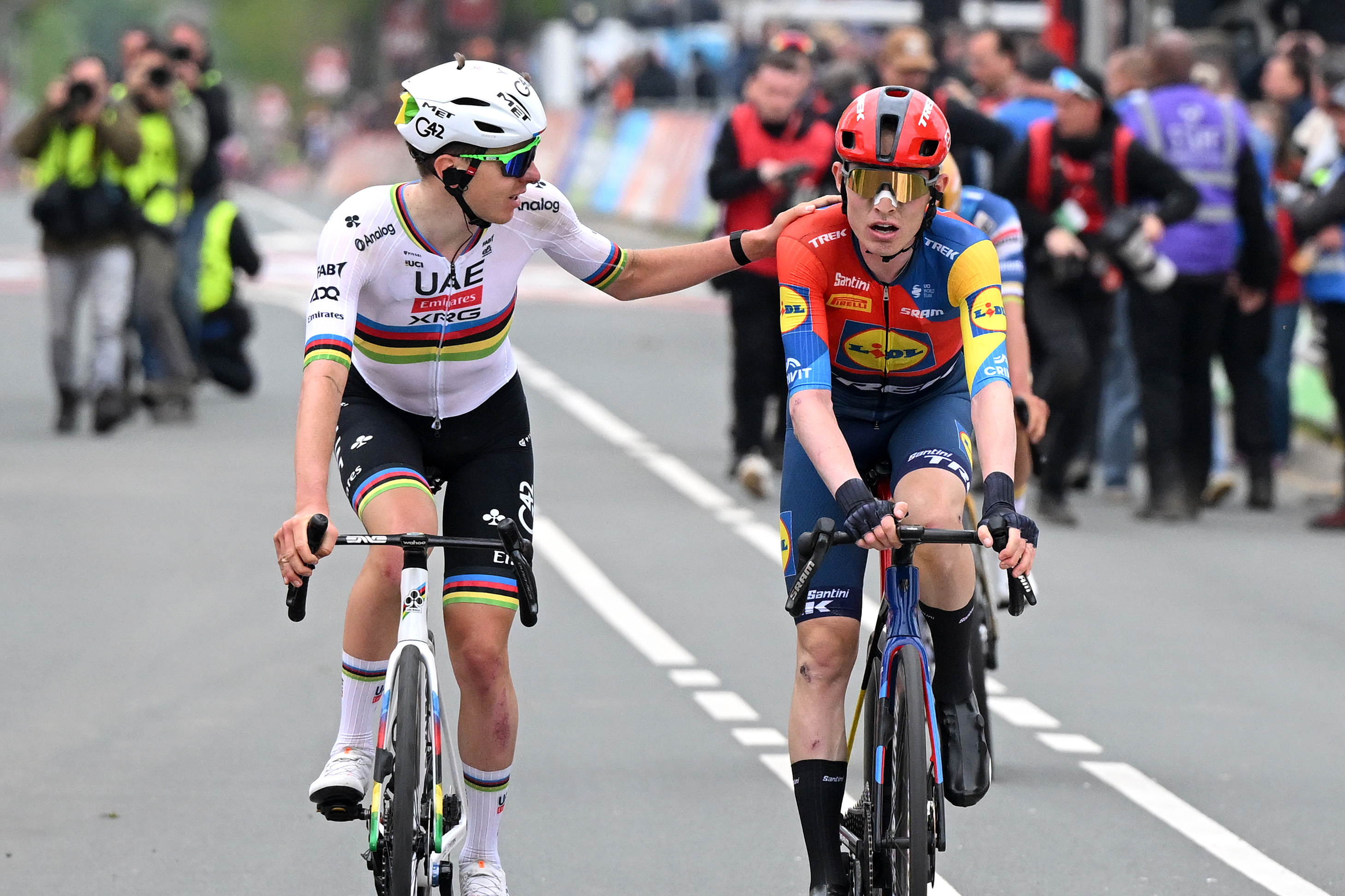 'The line was 5 metres too far' - Tadej Pogačar reacts to Amstel Gold Race second place
'The line was 5 metres too far' - Tadej Pogačar reacts to Amstel Gold Race second placeWorld champion reeled back and beaten in sprint by Lidl-Trek's Mattias Skjelmose
By Tom Davidson Published